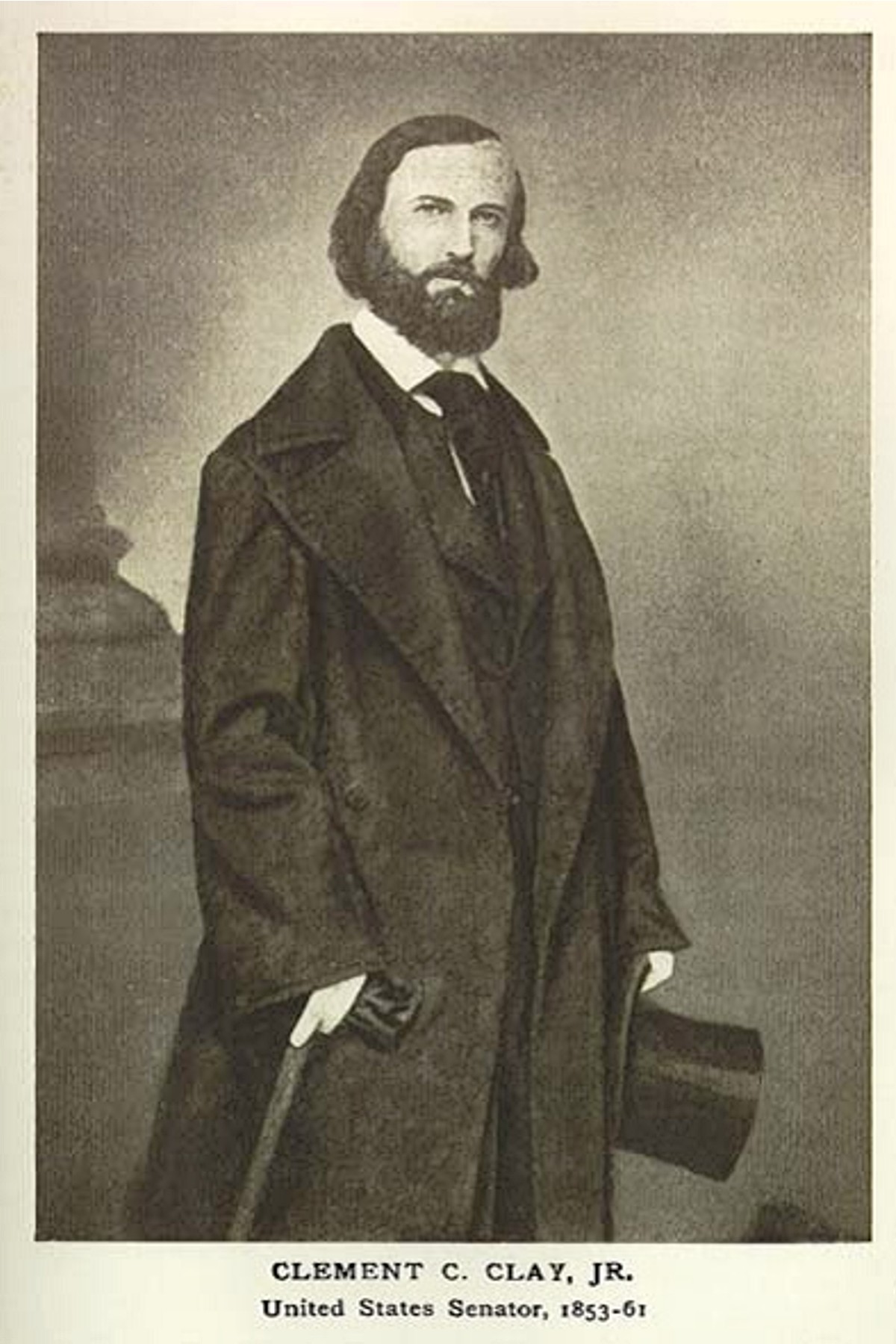|
Clement Claiborne Clay (C.C. Clay) had a successful career as a Lawyer, a Representative in the Alabama House of Representatives,
and a the Judge for the County Court of Madison County.
In 1848 - 1849 he had his eyes set on becoming a Senator for Alabama.
r2henshaw@yahoo.com

|
| Drawing of C.C. Clay when he was a U.S Senator |
C. C. Clays last act as a U.S. Senator: The Succession Speech
January 21, 1861
I rise to announce, in behalf of my colleague and myself, that the people
of Alabama, assembled in convention at their capital on the 11th of this month, have adopted an ordinance whereby they
withdraw from the Union, formed under a compact styled the Constitution of the United States, resume the powers delegated
to it, and assume their separate station as a sovereign and independent people. This is the act, not of faction or of party,
but of the people. True, there is a respectable minority of that convention who opposed this act, not because they desired
to preserve the Union, but because they wished to secure the cooperation of all, or of a majority, of the southern
or of the planting States. There are many cooperationists, but I think not one unionist in the convention; all are in
favor of withdrawing; from the Union. I am therefore warranted in saying that this is the act of the freemen of Alabama.
In taking this momentous step, they have not acted hastily or unadvisedly. It is not the eruption of sudden, spasmodic, and violent passion. It is the conclusion they
have reached after years of bitter experience of enmity, injustice, and injury, at the hands of their northern brethren;
after long and painful reflection; after anxious debate and solemn deliberation; and after argument, persuasion, and
entreaty have failed to secure them their constitutional rights. Instead of causing surprise and incurring censure, it is
rather matter of amazement, if not reproach, that they have endured so much and so long, and have deferred this act of self-defense
until to-day.
It is now nearly forty-two years since Alabama was admitted into the Union. She entered it, as
she goes out of it, while the Confederacy was in convulsions, caused by the hostility of the North to the domestic slavery
of the South. Not a decade, nor scarce a lustrum, has elapsed, since her birth, that has not been strongly marked by
proofs of the growth and power of that anti-slavery spirit of the northern people which seeks the overthrow of that domestic
institution of the South, which is not only the chief source of her prosperity, but the very basis of her social order and
State polity. It is to-day the master spirit of the northern States, and had, before the secession of Alabama, of Mississippi,
of Florida, or of South Carolina, severed most of the bonds of the Union. It denied us Christian communion, because it could
not endure what it styles the moral leprosy of slaveholding; it refused us permission to sojourn, or even to pass through
the North, with our property; it claimed freedom for the slave if brought by his master into a northern State; it violated
the Constitution and treaties and laws of Congress, because designed to protect that property; it refused us any share of
lands acquired mainly by our diplomacy and blood and treasure; it refused our property any shelter or security beneath the
flag of a common Government; it robbed us of our property, and refused to restore it; it refused to deliver criminals against
our laws, who fled to the North with our property or our blood upon their hands; it threatened us, by solemn legislative
acts, with ignominious punishment if we pursued our property into a northern State; it murdered southern men when seeking
the recovery of their property on northern soil; it invaded the borders of southern States, poisoned their wells, burnt their
dwellings, and murdered their people; it denounced us by deliberate resolves of popular meetings, of party conventions,
and of religious and even legislative assemblies, as habitual violators of the laws of God and the rights of humanity;
it exerted all the moral and physical agencies that human ingenuity can devise or diabolical malice can employ to heap
odium and infamy upon us, and to make us a by-word of hissing and of scorn throughout the civilized world. Yet we bore all
this for many years, and might have borne it for many more, under the oft-repeated assurance of our northern friends, and
the too fondly cherished hope that these wrongs and injuries were committed by a minority party, and had not the sanction
of the majority of the people, who would, in time, rebuke our enemies, and redress our grievances.
But the fallacy of these promises and folly of our hopes have been too clearly and conclusively
proved in late elections, especially the last two presidential elections, to permit us to indulge longer in such pleasing
delusions. The platform of the Republican party of 1856 and 1860 we regard as a libel upon the character and a declaration
of war against the lives and property of the southern people. No bitterer or more offensive calumny could be uttered against
them than is expressed in denouncing their system of slavery and polygamy as "twin relics of barbarism." It not only
reproaches us as unchristian and heathenish, but imputes a sin and a crime deserving universal scorn and universal enmity.
No sentiment is more insulting or more hostile to our domestic tranquility, to our social order, and our social existence,
than is contained in the declaration that our negroes are entitled to liberty and equality with the white man. It is in spirit,
if not effect, as strong an incitement and invocation to servile insurrection, to murder, arson, and other crimes, as any
to be found in abolition literature.
And to aggravate the insult which is offered us in demanding equality with us for our slaves, the
same platform denies us equality with northern white men or free negroes, and brands us as an inferior race, by pledging the
Republican party to resist our entrance into the Territories with our slaves, Or the extension of slavery, whichas its founders
and leaders truly assertmust and will effect its extermination. To crown the climax of insult to our feelings and menace of
our rights, this party nominated to the Presidency a man who not only indorses the platform, but promises, in his zealous
support of its principles, to disregard the judgments of your courts, the obligations of your Constitution, and
the requirements of his official oath, by approving any bill prohibiting slavery in the Territories of the United States.
A large majority of the northern people have declared at the ballot-box their approval of the platform
and the candidates of that party in the fate presidential election. Thus, by the solemn verdict of the people of the North,
the slaveholding communities of the South are " outlawed, branded with ignominy, consigned to execration, and ultimate
destruction."
Sir, are we looked upon as more or less than men? Is it expected that we will or can exercise that
godlike virtue which " beareth all things, believeth all things, hopeth all things, endureth all things;" which teaches us
to love our enemies, and bless them that curse us 1 Are we devoid of the sensibilities, the sentiments, the
passions, the reason, and the instincts of mankind? Have we no pride of honor, no sense of shame, no reverence of our
ancestors, no care of our posterity, no love of home, or family, or friends? Must we confess our baseness, discredit the fame
of our sires, dishonor ourselves, degrade our posterity, abandon our homes, and flee from our country, all for the sake of
the Union? Must we agree to live under the ban of our own Government? Must we acquiesce in the inauguration of a President,
chosen by confederate, but unfriendly, States, whose political faith constrains him, for his conscience and country's
sake, to deny us our constitutional rights, because elected according to the forms of the Constitution? Must we consent
to live under a Government which we believe will henceforth be controlled and administered by those who not only deny us justice
and equality, and brand us inferiors, but whose avowed principles and policy must destroy our domestic tranquility,
imperil the lives of our wives and children, degrade and dwarf, and ultimately destroy, our State? Must we live, by choice
or compulsion, under the rule of those who present us the dire alternative of an " irrepressible conflict" with the northern
people in defense of our altars and our fireside, or the mamumission of our slaves, and the admission of them to social and
political equality? No, sir, no! The freemen of Alabama have proclaimed to the world that they will not; and have proved their
sincerity by seceding from the Union, and hazarding all the dangers and difficulties of a separate and independent station
among the nations of the earth.
They have learned from
history the admonitory truth, that the people who live under governors appointed against their consent by unfriendly
foreign or confederate States, will not long enjoy the blessings of liberty, or have the courage to claim them. They feel
that were they to consent to do so, they would lose the respect of their foes and the sympathy of their friends. They are
resolved not to trust to the hands of their enemies the measure of their rights. They intend to preserve for themselves, and
to transmit to their posterity, the freedom they received from their ancestors, or perish in the attempt. Cordially approving
this act of my mother State, and acknowledging no other allegiance, I shall return, like a true and loyal son, to her bosom,
to defend her honor, maintain her rights, and share her fate.
The
Congressional Globe
The
Offical Proceedings of Congress, Published by John C. Rivers
Washington,
DC
Thirty-Sixth
Congress, 2nd Session.
Page
486
(this
document was only available in image format(.gif & .tiff), so I took the time to type the document.)
Rob
Henshaw
r2henshaw@yahoo.com

|
| Photo/Portrait of C.C. Clay as a U.S. Senator |
|